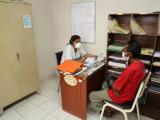Sep 13, 2007 (CIDRAP News) US health officials failed to follow international health regulations and made other errors in dealing with Andrew Speaker, the man with drug-resistant tuberculosis who sparked a health scare by traveling overseas in May, according to a report released this week by Democrats in Congress.
The report by the majority staff of the House Committee on Homeland Security says the Centers for Disease Control and Prevention (CDC) delayed informing the World Health Organization (WHO) that Speaker was traveling internationally despite having what was thought at the time to be extensively drug-resistant tuberculosis (XDR-TB). Under the International Health Regulations, the CDC should have informed the WHO immediately, but instead the agency waited 2 days, the report says.
The report also faults the Department of Homeland Security (DHS) for its role in various aspects of the episode and says it is not clear whether the federal agencies are working hard enough to prevent similar problems in the future.
Agencies 'didn't follow the playbook'
Rep. Bennie G. Thompson, D-Miss., chairman of the committee, said in a news release, "This was a real world incident, and there was a breakdown at the intersection of homeland security and public health. The government has numerous plans and policies in place to secure our communities, but they just didn't follow the playbook. This certainly raises questions about our homeland security if the government had this much trouble countering TB, let alone countering terrorism."
A CDC spokeswoman told CIDRAP news yesterday the agency was still reviewing the committee's report and was not prepared to comment on its specifics.
Against health officials' advice, Speaker flew from Atlanta to Paris on May 12, when he was believed to have multidrug-resistant (MDR) TB. After learning on May 18 of his trip, the CDC tried to locate him and warn him not to travel on commercial flights because of the risk of exposing others, according to an agency timetable of the events. On May 21 a CDC test indicated he had the more dangerous XDR TB.
The CDC contacted Speaker in Rome on May 22 and told him not to travel, pending further CDC instructions. But Speaker and his wife changed their itinerary to elude health authorities and, after several flights in Europe, flew from Prague to Montreal. They then rented a car and re-entered the United States, even though US Customs and Border Protection (CBP) had been warned not to let them cross the border. The CDC finally located him on May 25 and ordered him into isolation, the first such action by the agency since 1963.
On May 29, the CDC publicly announced the incident in an effort to alert people who had flown on the same transatlantic flights as Speaker so they could be tested for TB. Soon afterward, Speaker was flown to National Jewish Medical and Research Center in Denver, which specializes in treating respiratory diseases. Tests there eventually showed that he had MDR TB, not XDR TB, meaning that more drugs were likely to be effective. But the CDC said it still would have publicized the case even if it had known the true diagnosis when Speaker was traveling in Europe.
Slow notification of WHO
The House committee report says the CDC "did not properly adhere to the International Health Regulations" in handling Speaker's case. The agency told CBP on May 22, a day after the positive test for XDR TB, that Speaker was believed to be a significant public health risk, the report says.
The report continues, "Under the International Health Regulations, CDC should have informed the World Health Organization (WHO) that same day of this significant public health risk. Instead, CDC delayed an additional 48 hours before informing WHO on May 24. Had the CDC informed the WHO earlier of the situation, European authorities may well have been able to apprehend Mr. Speaker while he was still overseas."
The report also says the CDC, in managing the incident, "relied too heavily on strong interpersonal relationships" with officials in other US and foreign agencies, rather than using formal channels. For example, the agency worked with CBP personnel at the Atlanta quarantine station instead of CBP officials in Washington, DC. Also, in communicating with the Italian Ministry of Health, the CDC worked with a former CDC employee who was on the staff there.
The committee also questions the CDC's handling of the problem of returning Speaker to the United States without endangering anyone else. The CDC was considering various options, including using its own plane, when it learned on May 24 that Speaker had already re-entered the country, the report notes.
"To date, the CDC has not developed a plan to repatriate a patient given the exact same set of circumstances," the document states.
Other findings in the report include:
- Government officials could legally have prevented Speaker from traveling within, outside, and back into the United States, but failed to use "aggressive" measures soon enough.
- The "egregious failure" of the CBP to keep Speaker from re-entering the country remains unexplained, but the CBP has made changes to prevent such mistakes.
- It took several hours for DHS to get Speaker on the Transportation Security Administration's "no fly" list, because the fact that he was not a terrorist caused confusion about which list he could be put on.
"Though it is clear that all parties involved in this episode are aware of these shortfalls, it is not as clear to the committee that they are being addressed with the urgency and attention necessary to prevent a similar series of events from occurring again today," the committee says in a summary.
CDC reviewing the report
Shelly Diaz, a CDC spokeswoman in Atlanta, said yesterday the agency was reviewing the committee's report but was not ready to comment on its specifics.
"We provided a lot of information for the report," she said. "There's no question that there are lessons to be learned. We've been looking at the CDC actions."
Diaz said the agency is conducting its own review of the episode, but she couldn't predict how soon that would be completed.
"We've taken major steps to improve our performance," including efforts to improve communication with state and local public health agencies, the WHO, and other national health ministries around the world, she said.
See also:
Jul 5 CIDRAP News story "Severity of TB case in health scare downgraded"
May 29 CIDRAP News story "Airline trips by resistant-TB patient trigger alert"



















